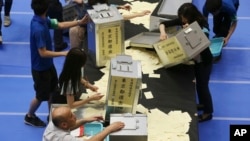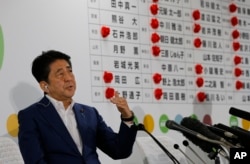Exit polls from Japan's parliamentary election show Prime Minister Shinzo Abe's ruling coalition will take the majority of the seats in the House of Councilors; parliament's less powerful upper house.
Media projections from Sunday's vote show the coalition may have won the two-thirds majority in the contested body, despite voters' doubts about Abe's economic policies and his goal of removing a war-renouncing clause from the country's post-World War II constitution.
Analysts say if Abe takes two-thirds of the seats up for grabs in Sunday's vote, he will have a good chance of revising the country's postwar pacifist constitution for the first time. A referendum, however, would be needed and many Japanese still support the country's pacifist stance.
Some Japanese agree with Abe that a constitutional change is needed because of growing fears about terrorism, as well as concerns about a nuclear North Korea and China's military assertiveness.
Abe has stressed during his campaign that there has not been enough time for people to feel the results of his so-called "Abenomics" monetary program.
"Abenomics has never failed, but is still half done," Abe said Saturday in Tokyo."All we have to do is to push for the policy firmly and steadily."He urged voters for patience with his economic program.
Critics say despite frustration with "Abenomics" conservative fiscal policies, the opposition has been unable to offer persuasive alternatives.
Sunday's balloting is the first election since the voting age has been lowered from 20 to 18.Japan has not been able to determine just how many of the more than two million new eligible voters will actually vote in the polls or how they will vote.
Some material for this report came from AP, AFP and Reuters.






